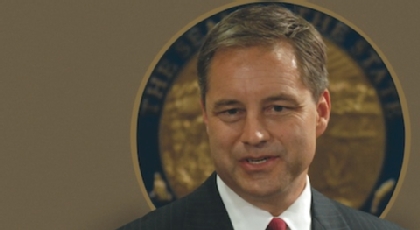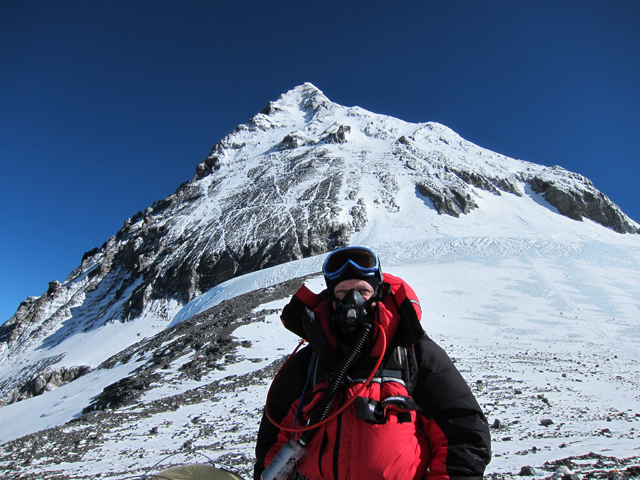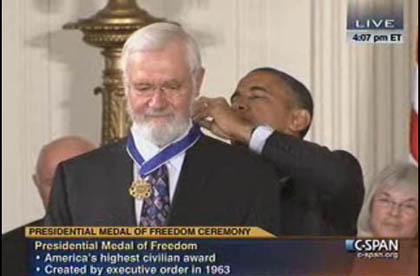Page 529 • (5,687 results in 0.069 seconds)
-

often overbooked, with patients waiting for care. They plan to expand, but may need a few million if a grant doesn’t pan out. They look expectantly at Parnell, who remains pleasant, but noncommittal. “Budget time,” he smiles as he climbs back in the SUV that seems to be the favored mode of transportation in this state. Then it’s off to the airport and a flight to Juneau to meet with lawmakers later that night. It’s going to be another long day. Read Previous A ‘Twilight’ experience Read Next LEED
-
March 21, 2011 Stories of real people give a face to atrocities As Noemi Schoenberger Ban looked at her mother, one last time, the message was clear, Ban recalled. “Her eyes told me to take care of myself,” Ban said. And then her mother, baby brother and younger sister were gone, lost in the line that was going toward a barracks to “take a shower.” It was only weeks later that Ban realized what had really happened to her family in Auschwitz concentration camp. Ban told her story to a hushed
-

said. Nelson, himself had a mild case of pulmonary edema he had to overcome. It can be fatal, if not taken care of properly. He listened to the doctors and treated it by dropping altitudes and taking the proper pharmaceuticals. “They have doctors up there,” Nelson said. “They green lighted me and there I went.” “It can be a big danger if you come down with that because you can’t really move,” he said. “I guess I took a risk by doing that, but it didn’t feel like that at the time. “There was time
-

been, quite simply, recognized as one of the most important figures in public health. Shaping the global health care discussion Foege became executive director of The Carter Center in 1986 and continues to serve the organization as a senior fellow. He has served on the PLU board of regents and received an honorary doctorate from PLU in 2000, when he was the university’s commencement speaker. He helped shape the global health work of the Bill and Melinda Gates Foundation, and remains a champion of
-

early retirement package in the 1980s. “But I’m going to be 83 years old this summer and I think I’m getting old,” she said. “I need to kind of retire and take it easy for while.” But taking it easy may not be in her DNA. “I want to do something different,” she said. “First I want to do nothing, but then I want to go through my papers. I have my own immigrant collection.” She also has plans to clean out her house, digitize photos, take care of her garden, maybe sell her house, visit friends and
-

, service, leadership and care — for other people, for their communities, and for the Earth.” I am grateful that our faculty members versed in immigration law and the constitutional rights of individuals are strong voices on our campuses, in our communities, and on the national stage. I am also grateful for the work in the Student Life Division, and in our Student Services and financial aid offices to provide resources and referrals to our students. A web site has been created for undocumented students
-
. Mehlum has actively served her community through numerous volunteer board positions. Distinguished Alumnus Award Dr. Jeffrey Probstfield ’63 Dr. Probstfield has dedicated his life to PLU and the international cardiovascular health care community. Probstfield is professor of medicine in the Division of Cardiology at the University of Washington. He has led multiple national and international studies throughout the past three decades investigating optimal treatments for many conditions, including heart
-
fit for college students, staff and faculty,” Vagts said. “She’s passionate about developing leaders, always looking to find the right way to engage someone and help them discover or deepen a gift or interest of theirs.” Rude also has served as a colleague in ministry at Grace Lutheran Church in Evanston, Illinois, an associate pastor at Resurrection Lutheran Church in Chicago, and as youth outreach minister for The Night Ministry in Chicago, where she provided pastoral care, crisis response and
-
pastoral care, crisis response and advocacy in an interfaith and multicultural setting for young adults experiencing homelessness. Rude says she was enchanted with PLU’s philosophy early in the process that called her to campus. She was struck by remarks from President Thomas W. Krise, in one of her interviews, about his aspirations for an inclusive campus. “He told me ‘if we can be a school that’s welcoming to Muslim students and welcoming to transgender students, then I feel like we’re on the right
-

the world,” Frey said, adding that optimum access to teaching, learning and living spaces is necessary to fulfilling the institution’s mission. “Renovations and repairs that are ADA-compliant serve everyone. It means that all students have access to space and, ultimately, to the diversity of voices that speak in the classroom. That’s the positive.” Shared knowledge is key to the process, Orr stressed: “It takes all of us to figure it out. I need the input, understanding and communication amongst
Do you have any feedback for us? If so, feel free to use our Feedback Form.


